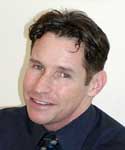-
- Judge rules being called ‘homosexual’ is not libelous
- Gay Republican group protests GOP push to ban same-sex marriage
- Philadelphia airs one of first commercials to attract gay and lesbian tourists
- Gay and lesbian Catholics denied communion at Chicago Mass
- Wilton Manors emerges as a gay mecca
- Internet scammer, using best-selling fraud, gets 33 months
- National News Briefs
- World News Briefs
commentary
Revenge of the ‘normal people’
Published Thursday, 10-Jun-2004 in issue 859
Beyond the Briefs
The recent controversy at Poway High School, where a student was suspended for wearing an antigay T-shirt, and efforts by those who sought to intimidate GLBT youth attending the recent Youth Pride Festival, May 1, reminded me of efforts a few years ago by antigay forces to intimidate the GLBT community.
Several years ago, a group called “The Normal People,” organized by Roger Hedgecock, tried to march in the Pride Parade. Pride organizers, noting that the group wanted to partake in the parade – not to support Pride but to disparage it – rightfully denied the group a chance to march.
The group called it “discrimination” and it sued. A judge ruled that the First Amendment allowed Pride to pick those groups in support of its message. “The Normal People” certainly could have found a more receptive place in marching with the Nazis, or the KKK, or other hate groups during one of their parades.
The ruling was no surprise. It was based on a Supreme Court ruling holding “parades” are a form of speech. Parade organizers can restrict marchers to those who support the theme of the parade.
In reports carried in this paper and others, individuals aligned with antigay activities recently conspired to intimidate festival goers at the recent Youth Pride events. On a local radio show, the organizers claimed to have videotaped youth entering the festival. Some protesters gained entry. Others claim they were denied entry because event organizers wanted to know if they were GLBT. They complained of bias to the city council and the media.
In a letter to the San Diego Union-Tribune, Allyson Smith, a writer for the conservative newsletter San Diego News Notes, owned by Jim Holman, editor and publisher of The Reader, wrote: “Christian youth who tried to enter the event accompanied by an adult were turned away, in a blatantly illegal act of discrimination, after they refused to admit they were homosexual as a required litmus test for admission.”
In a later letter to the paper, Ben Cartwright, president of San Diego State University’s LGBT Student Union, said that he “was not asked to prove anything other than [his] age to enter the event. Nor were any of my friends, including heterosexuals.”
It’s quite obvious from all accounts that these people (inside and outside) were not at the event in support of GLBT youth. They were there to intimidate them. They wanted to disrupt the event and generate media coverage for their cause.
Therefore, even if Smith’s claim were true it would certainly be lawful under California law to deny access. California’s civil rights statute, known as the Unruh Civil Rights Act, allows entities to exclude individuals whose presence is likely to disrupt the activities. Courts in California have permitted county fairs, for example, to exclude gang members from entry.
These people are part of the same ilk as those who protest and block women who seek access to abortion-related services. And, in the past, some of the folks associated with abortion protests have also been bombers. Some of us remember the Rev. Dorman Owens. Organizers of the Youth Pride event have every reason to suspect the motives of antigay people who seek access to a youth event; under the law, they have a duty to protect the youth attending the event from possible harm.
When these people attend the Pride celebration in the summer, they are required to make their protest in a free speech area reserved for that expression. They can’t jump into the parade with their “God Hates Fags” signs. At the festival, they can’t hassle people at the event. They can’t be disruptive or they’ll be arrested. They know the rules.
So they pick on Youth Pride. To me, it’s just another form of harassment of GLBT youth. At some point, the law has to treat efforts to harass gay youth for what it really is: child abuse. The city attorney and the district attorney should investigate the activities of groups that harass GLBT youth and bring appropriate charges.
California Penal Code sec. 423.1 makes it a crime for any person to intimidate or interfere with any person lawfully exercising or seeking to exercise the First Amendment right of religious freedom at a place of religious worship.
It’s time for that statute to be amended to protect persons who seek to exercise the First Amendment right of celebrating and embracing diversity at a place of celebration.
|
|
Copyright © 2003-2025 Uptown Publications


